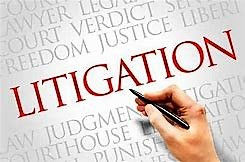What Is Litigation?
- Brandie Rose DeVore

- Feb 12, 2019
- 4 min read

What Is Litigation?
Litigation is considered an effective process to settle disputes as it uses the knowledge and discretion of an independent third party or judge to review the matter. Here, both parties get a chance to present their case with all the evidence, witnesses and documents available. The judge or jury then passes a verdict based on these facts. In most cases, the ruling of the judge is also subject to appeal as the court systems have an extensive appeal process available. The litigation process could take several months to a few years depending on the case. There are several court fees and attorney charges involved which as well could make it quite expensive to undergo.
What is the process of litigation?
The process of litigation begins with the process of pleading. First, the plaintiff files a complaint against the defendant. Once this is complete, the defendant is served a summons along with a copy of the complaint. Usually the defendant is given twenty to thirty days to respond to the complaint by filing it in court. Subsequently, the discovery process begins which is crucial to the litigation process. It involves recorded interrogations, requests to produce relevant documents and admission of facts. Depositions are obtained from witnesses as well. These depositions contain the witnesses’ testimonies prior to trial. Generally, subpoenas are issued to third parties to gather relevant documents and substantial evidence to support the case. This exchange of evidence allows both parties to get a chance to study each other’s evidence and get an understanding of their position in the trial. The conclusion of the discovery process leads to a trial date being set for the case to be heard by the judge. The judge rules on the case based on the proof submitted. Once the judgment is passed, either party could appeal the decision within ten days from the entry of the judgment. There is an additional option to appeal with the next court in the hierarchy—the court of appeals or the Supreme Court. However, in most cases, no new evidence can be submitted during the appeal process.
I am involved in a federal litigation and the defendants would like to settle. How do I go about this? Can I request for a mediator?
A settlement agreement or a mediation which could lead to a settlement is usually encouraged by the court as it facilitates efficiency, saves time and reduces the expenses of a complete trial. The decision to settle is between the parties. Usually the defendants try to persuade the plaintiff to provide a figure they are willing to settle at since the plaintiff is requesting for the amount. If you have already stated the figure you are considering, you can ask the defendant to begin the negotiation. If they disagree with the amount quoted by you, ascertain the amount they are willing to offer. It would be sensible to refer to books and material on negotiation techniques especially if you are representing yourself in the matter. The judge does have the discretion to grant a mediation as it promotes effectiveness but if the other party provides an impression that there is no possibility of reconciliation, the judge may deny the request.
My attorney says a motion to reconsider will provide thirty extra days to file an appeal since my case was not handled properly previously. Is this correct?
This procedure is considered more of a tactic practiced by appellate attorneys as it provides more time to file an appeal. Filing a motion to reconsider is similar to getting a second chance with the trial judge to re-present the facts, argue the case and wait for the judgment based on this motion. If you lose this motion as well, you can appeal the decision with a higher court. The time available to appeal starts once you have received the written ruling from the judge. This would imply an additional thirty days from the date of the written ruling.
I have recently undergone a trial where the jury has awarded me some money. However, the losing party has decided to appeal. I cannot afford another trial. What are my options?
You have several options here. You could go ahead with the appeal process using the help of the court clerk or try pro bono representation by approaching the bar association and court. Another option would be to negotiate with the lawyers of the defendant to arrive upon a settlement for a lower amount or any other amount suitable to both parties. Alternatively, you could choose to drop the case and end the matter immediately.
The litigation process can be both overwhelming and tedious whether you are dealing with it for the first time or have done so several times before. There are many rules and procedures involved in a litigation and trial that can differ with every case. Attorneys can also play a crucial role in fighting a lawsuit within this legal framework. Additionally, the litigation process itself can be quite expensive and time consuming. To understand more about it, consult an Expert who can guide you with the right information and clarify all your doubts.




Comments